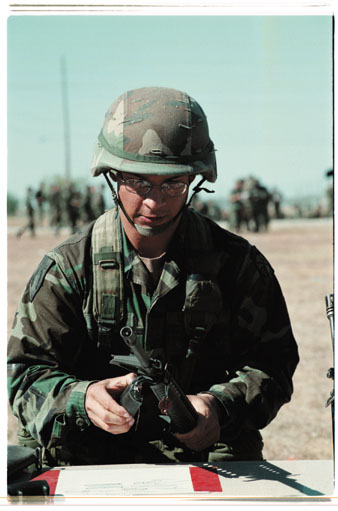By Alan Melson staff reporter The Walsh Center for the Performing Arts was again deluged with water Sunday as a rehearsal hall flooded for the third time in 12 months. The sound of music was replaced with the sound of vacuum cleaners as a TCU Facility Services crew continued its efforts to clean up the Broyles-Breeden Instrumental Rehearsal Hall, where various groups from the TCU Band rehearse. Will Stallworth, assistant vice chancellor for plant management, said he received a call Sunday afternoon about a problem in the building and went to investigate. "When I arrived, there was standing water in the band room," he said.
"We've had continuing problems with the walls around the band hall," he said. "Whether it is heavy rain or sprinklers or whatever, the drains around the outside of the building just cannot handle the amount of water we've been getting." The building experienced similar flooding that also caused damage to the rehearsal hall in October 1998 and in May 1999. Stallworth said a cause has not yet been determined. "I don't know exactly what happened," he said. "We have a consultant coming in on Thursday to take a look and see what they think." The flooding caused major damage to special carpeting in the rehearsal hall. The carpet, which features a thick acoustical pad underneath, was installed last spring to "deaden" the room after musicians and band staff complained that it was too reverberant. The carpet has already been ripped up and reinstalled once, after it was soaked by the May flooding. Theril Williams, a project manager for Marshal Utley Carpets, the firm who has handled installation and removal of the carpeting in the room, said the entire carpet will probably have to be completely replaced this time. "We even had to install a new border around the carpet after it shrunk when we dried it out. My guess is that we won't be able to use it again," Williams said. A crew from Blackmon-Mooring Steamatic, an environmental cleanup company, spent Monday removing the soggy carpeting and cleaning up the floor underneath, displacing ensembles who normally rehearse in the room. The Monday-Wednesday-Friday Jazz Ensemble was forced to rehearse out on the lawn in front of the Walsh Center. Curt Wilson, director of the ensemble and director of Jazz Studies at TCU, said the flooding has become more than just a minor inconvenience. "We are afraid to hold any kind of major activities around here now because there's always the chance this could happen," he said. "We are already short on space in this facility as it is, and then we have to deal with this on top of that. "This is a dysfunctional building as far as instrumental music is concerned. This problem really needs to be addressed." The musicians most affected by the flooding were the percussionists, who had to move dozens of pieces of equipment out of the band hall and adjoining storage room to avoid water damage. Tom Alexander, a graduate student in percussion performance, said the flooding has disrupted musicians' practice time. "It was a big hassle," he said. "Many of the percussionists had to move a lot of things, some of which were electrical and had been sitting in water. Now all of our equipment is being stored in our main practice room, which will definitely affect our ability to practice in there." Leah Sharp, a sophomore interior design major who is a percussionist in the TCU Wind Symphony, said this is a problem that should have already been addressed. "When it flooded last fall, I had $500 of percussion mallets ruined, and they weren't covered by insurance," she said. "It's getting to the point that something needs to be done soon it's a big pain." Garrison said the university will continue to investigate ways to alleviate the flooding problem. Brian Youngblood, interim associate director of bands, said he hopes the problem is not difficult to solve. "I'm not a contractor, and I don't know how to fix it, but this has to be addressed one way or the other," he said. "I can turn on my sprinkler and run it for 20 hours against the side of my house, and it doesn't come in my living room. Why is it a problem here?"
Alan Melson
By Matt Welnack staff reporter In an effort to serve as a role model for the Tarrant County community, TCU organizations are celebrating Red Ribbon Week/National Collegiate Alcohol Awareness Week this week to educate students about the dangers of drinking and driving. "I think it is really important for TCU because it is important in Tarrant County," said Angie Taylor, director of the Alcohol and Drug Education Office. "I think it is important to take part in a community activity to demonstrate our support in and of the community." Red Ribbon Week is a chance for people to stand up and say no to drugs in their community, Taylor said. It was proclaimed by Congress in 1988 in memory of a Drug Enforcement Agency agent that was killed in the line of duty. "It is a week set aside that community members can stand up and say they want a drug-free and healthy society," Taylor said. "They can do that by wearing a ribbon and supporting Red Ribbon Week." TCU organizations such as CHAMPIONS and HyperFrogs will go out to elementary schools this week to talk to students about making decisions for the future and making positive choices such as staying in school. Stacey Sabala, a senior finance and accounting major and president of CHAMPIONS, said her group can give kids a positive look into their future. Members visited North Himount Elementary School Monday to talk to children in first through sixth grade at an assembly. "We are trying to make a positive impact on society through health awareness," Sabala said. "I think it is important to have someone who they look up to tell them if they don't do drugs and stay in school, they can go to college, too." Taylor said it is important for TCU students to get out and interact with the children in the TCU community. "I think it is really important because a lot of these kids look up to TCU students," she said. "I really think it allows both students to see a glimpse of the future."
Matt Welnack
By Steven Baker staff reporter TCU students armed with markers, paint brushes and construction paper will attempt to promote world peace this week during Posters for Peace. Students involved in the campus organizations Hillel, TCU Hunger Week, Uniting Campus Ministries, Catholic Community, Chi Delta Mu and TCU Peace Action have created posters that will be displayed Tuesday and Wednesday in the Student Center Lounge. Each poster will represent a different unifying theme from each organization, but all will contain the phrase: "Increase the Peace." The Rev. Charles Calabrese, Roman Catholic campus minister to the university, said anything TCU can do to counter the violent American culture is beneficial. "We are a global society now and need to learn to live cooperatively and harmoniously," he said. "I have become so conscious of the violent images in the media. All the murders and people being blown away that we see on TV and the movies do affect us. Whatever we can do to promote peace is crucial." Mandy Mahan, public relations chairwoman for UCM and co-founder of TCU Peace Action, said there is a need to campaign for peace in the world. "We want to get the word out that the lack of peace has always been a problem and always will be if we don't do something about it," the sophomore religion major said. "Posters for Peace is one step forward to solving this problem. This is a global problem, and everyone needs to take responsibility for it." Students can come by the Student Center and design their own posters. After Wednesday, the posters will be removed from the Student Center Lounge and placed at different locations across the campus.Kathleen Jeffery, social justice chairwoman for UCM and a senior religion major, said some TCU students are only concerned with what is going on in their own lives. "TCU students are notoriously apathetic," she said. "The majority of students live in the TCU bubble. There is a huge need for peace in this world. As citizens in this world, we need to take an active part in the peace process." Posters for Peace is sponsored by UCM and TCU Peace Action, a campus organization started this fall. TCU is one of 40 affiliates of a larger organization, Student Peace Action Network. SPAN was created in 1995. Amber Waldref, national coordinator for SPAN, said college's learning environment provides the best opportunity for students to get involved in promoting peace. "Making a poster isn't hard, but it will begin to open up students' minds in working for a more just world," she said.
Steven Baker
By Lori Eshelman staf reporter Dr. Stuart L. Brown, child play expert and this year's Green Honors Chair for the School of Education, will give a public lecture titled, "The Natural History of Play: Joy or Violence," from 7 to 9 p.m. Wednesday in the Dee J. Kelly Alumni and Visitors Center. Brown, who is the president of the Institute for Play in Carmel Valley, Calif., has researched the effects of play during childhood and concluded that virtually all highly violent, anti-social men had childhoods characterized by almost no normal play. Brown was a member of the team that studied the life of Charles Whitman, the man known for his 1966 shooting spree from the tower at the University of Texas. Mike Sacken, a professor of educational foundations and administration, said Brown's visit to TCU is especially relevant following the Sept. 15 shooting at Wedgwood Baptist Church. Larry Ashbrook, a man described as an emotionally troubled loner, opened fire inside the church, killing seven people and then himself. "We had already made the arrangements for (Brown) to come before (the shooting) happened," he said. "So it is really eerie that something like that would happen." Sharon Reynolds, a professor of educational foundations and administration, said Brown was originally scheduled to speak at TCU next spring. "After the shooting, I called to see if he could move his performance up," she said. "We thought it would be very timely." Sacken said although Ashbrook's profile made Brown's visit to TCU timely, he was invited to speak because of the faculty members' interest in his research. "(Brown's research) really ties in well to early childhood education, and his philosophy of orientation and beliefs in this really fit with (the curriculum of the School of Education)," he said. In addition to the lecture, Brown will also host a discussion session at 9 a.m. Thursday in Bailey Building, Room 113. It is open to all faculty members and students. Reynolds said Brown also plans to meet with the Mayor's Task Force Friday to discuss his research conclusions and how they relate to the Wedgwood shooting.
Lori Eshelman
By Carey Hix staff reporter The new interim director of the School of Music may have many ideas about what the school needs, but he said he is very adamant about not making those changes without the help of the faculty. John Burton, associate dean of the College of Fine Arts and Communication, was appointed to the position Oct. 13. "I don't plan on doing things single-handedly," he said. "I plan on involving the faculty in any changes." Burton will have more of an idea about needed changes after he's been in office for a while, and he looks forward to working toward those changes with the help of the faculty, he said. "The changes I want to make are toward a shared leadership and a shared vision of where we want to go," he said. "I have my own ideas, but for me to include my own ideas and to disregard what the faculty wants to do is not how I'm going to (operate as) the director. I think personally there are many changes we need to make, but that's for a faculty meeting down the road." The present director of the School of Music, Kenneth Raessler, will retire in Spring 2000. The title of interim director will take effect June 1, 2000, Burton said. "It is my hope that the transition between the director of the school and the interim director of the school will be just as smooth as it can be, and I will do my best to make that happen," he said. "My mission is to make the transition as smooth as possible, and yet, not just hold our place in line but to move forward with some initiatives and some ideas." Burton was chosen as interim director because of his administrative experience as associate dean and graduate director, said David E. Whillock, interim dean of fine arts and communication."John Burton was chosen through a series of interviews and discussions with the candidates," he said. "One candidate decided that he would rather not take the job. Another candidate would accept the position but would rather that we select from other candidates. That left two very qualified individuals for the position." Burton possesses qualities that will be assets to the position, Whillock said. "He has been in administration and brings a sense of organization that is needed for such large faculty," he said. "(Burton) will continue the growth of the school and will not be just a place holder. I believe John will bring his own style of management to the school and will present to the new permanent director a school of music that TCU will be proud of." Burton said the new position is an opportunity for him to return to his roots. "I'm a musician, a cellist," he said. "I'm looking forward to coming back home to work with my fellow musicians." Continuing the good work the department has done so far and providing several initiatives for proceeding into new areas are two of his goals, Burton said. "Specifically, my goals are to work closely with this faculty and to let the faculty have a say in the direction and to lead by cooperation into an era where the faculty have chosen to go," he said. Blaise Ferrandino, an associate professor of music and one of the four candidates originally considered for the position, said Burton has much to offer. "I think it's a marvelous choice," he said. "I can't think of anyone better qualified for the job." Burton said his philosophy of life revolves around being prepared for opportunities that may arise. "I think what has enabled me to get where I am is that I've been prepared for the opportunities that have come my way," he said. "So what I try to instill in my students, and what I try to do personally, is to be prepared in terms of my intelligence, in terms of my training, my preparation and my work ethic, so that I am prepared if a certain door opens." Being prepared is something anyone can do, Burton said. "You don't know what doors are going to open, and certain ones open and certain ones remain closed, but I think (it's important) just to be prepared by a certain work ethic and to be looking for opportunities," he said. Burton said he has attended programs to help develop his skills as an administrator. Last summer, he went to Harvard University to attend a nationwide management development program. "That (training at Harvard) has really helped me in looking at problems," he said. "There are many different ways of looking at a particular problem and finding a solution, and the solution may have more than one component to it." Alicia Stephenson, a sophomore premajor and a former student of Burton's, said he is a good choice for the position. "I think he's going to do a great job because he has a lot of knowledge, and he's really organized," she said. "He's really easy to work with."
Carey Hix Feature Story
In the army now KILLEEN, TEXAS - Grenade explosions pierced the silence at Fort Hood this weekend when Ranger Challenge members competed against 25 other schools in the 5th Army ROTC Brigade Ranger Challenge.
TCU's purple team tied for first place with Texas A&M. The Aggies took home the first place trophy, however, because they placed first in the most events. The TCU white team finished ninth.
"Honestly, I'd be lying if I said I wasn't a little disappointed," said Joel St. Clair, a junior nursing major and platoon sergeant for the purple team. "But there's always the element of disappointment when you strive to be the best." Capt. Thomas Pentecost, an instructor for the Ranger Challenge team, said he was impressed with both teams' efforts. "They were absolutely beautiful to watch," he said. "We had one of our cadets push himself so hard that he literally collapsed at the finish line (of the ruck run)." Despite the official second-place finish, purple team members said they took pride in the tie for first place. "The effort we gave was definitely above and beyond 100 percent," said Chris Foster, a senior pre-med major and team commander. "Because we know that we tied for first, our goal was to beat Texas A&M, and we accomplished that." Team members said training and teamwork were the biggest reasons for their success because Texas A&M and other large schools had a wider pool from which to choose their teams. Texas A&M sent its best six cadets out of 600, while TCU sent its six best from a pool of 60, Pentecost said.
Jason Smith, a senior pre-med and criminal justice major, agreed, saying the odds were against TCU going into the competition. "For a school like TCU to do as well as we have is an accomplishment," he said. "It would be like a six-man football team going against a 5A high school team." St. Clair said teamwork was the key to the purple team's success. "You'll find out if you are truly a team or not," he said. "Every event came down to 'team, team, team.'" Going into the last event, the 10K ruck run, the purple team led A&M by five points. Teams start with six members, but they have the option of finishing with five. All six of TCU's members crossed the line. "Even if we had to walk, we would have despite the consequences," Foster said. "A Ranger never leaves a buddy behind."
"We should all feel the same pain at the end," he said. "If we don't, then we know we haven't given our all, and we didn't do our job." The purple team finished the ruck run in 1:10.36, six minutes better than last year. "That was six guys who were on the tail end of a brutal weekend," St. Clair said. "We have no room for individual pride in the road marches. Don't ever be too proud to ask for help from your teammates. We never leave a teammate behind." Story by Matt Welnack and Photos by David Dunai
|
| The TCU Daily Skiff © 1998, 1999 Credits |
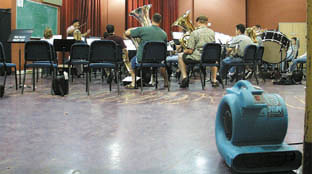 Larry Garrison, assistant director of facilities planning
for TCU, said the water apparently was coming in through the foundation.
Garrison said the flooding was probably a result of runoff from sprinkler
systems outside the building.
Larry Garrison, assistant director of facilities planning
for TCU, said the water apparently was coming in through the foundation.
Garrison said the flooding was probably a result of runoff from sprinkler
systems outside the building.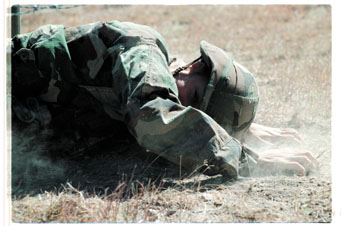 TCU's two Ranger Challenge teams competed against schools from Oklahoma,
New Mexico and Texas. Seven events made up the competition, including a
grenade assault course, weapons assembly course, 6K relay race and 10K
ruck run. During the ruck run, team members carried full gear, including
35-pound backpacks.
TCU's two Ranger Challenge teams competed against schools from Oklahoma,
New Mexico and Texas. Seven events made up the competition, including a
grenade assault course, weapons assembly course, 6K relay race and 10K
ruck run. During the ruck run, team members carried full gear, including
35-pound backpacks.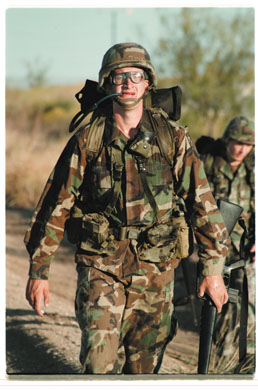 Texas A&M and TCU were the only schools to place both of their
teams in the top 10.
Texas A&M and TCU were the only schools to place both of their
teams in the top 10.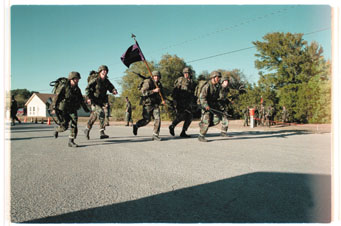 "Our best was every bit as good as (Texas A&M's) best,"
he said. "I'm frustrated for them because we're not able to bring
home the big trophy."
"Our best was every bit as good as (Texas A&M's) best,"
he said. "I'm frustrated for them because we're not able to bring
home the big trophy."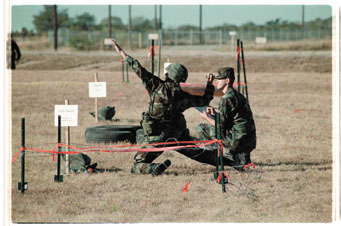 Smith, who is also the battalion commander, said team members literally
pulled each other when they were down so that everyone could cross the
line together.
Smith, who is also the battalion commander, said team members literally
pulled each other when they were down so that everyone could cross the
line together.